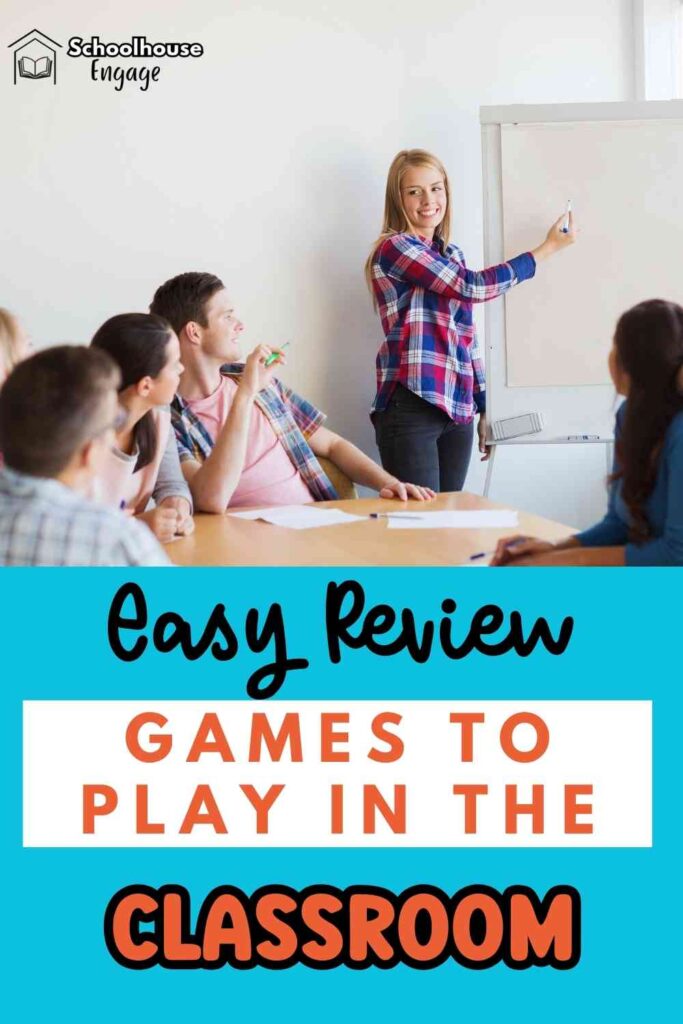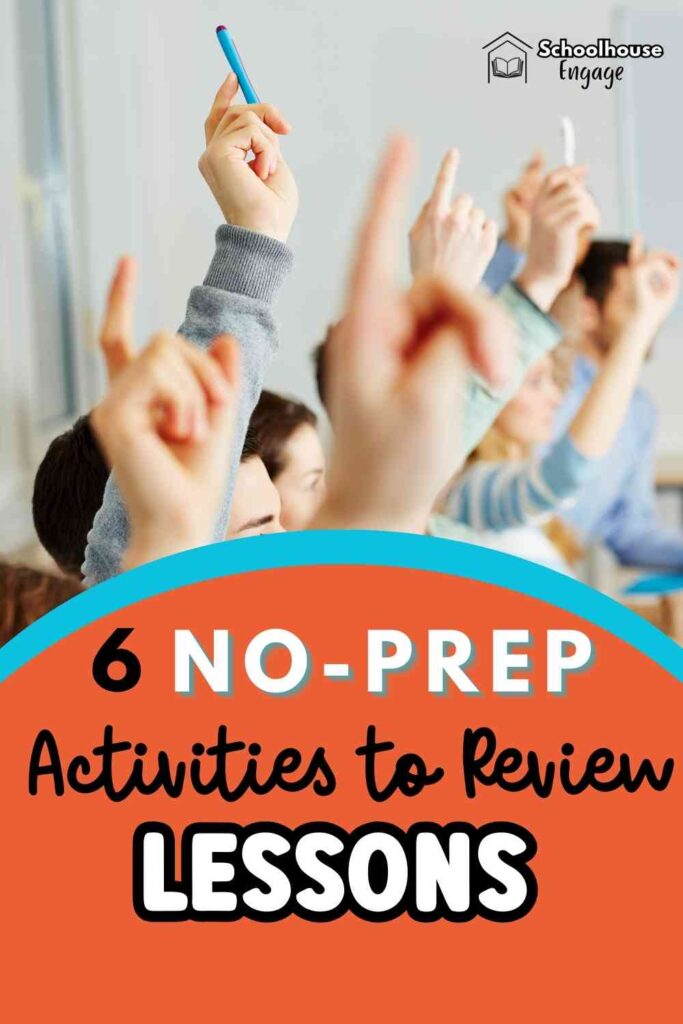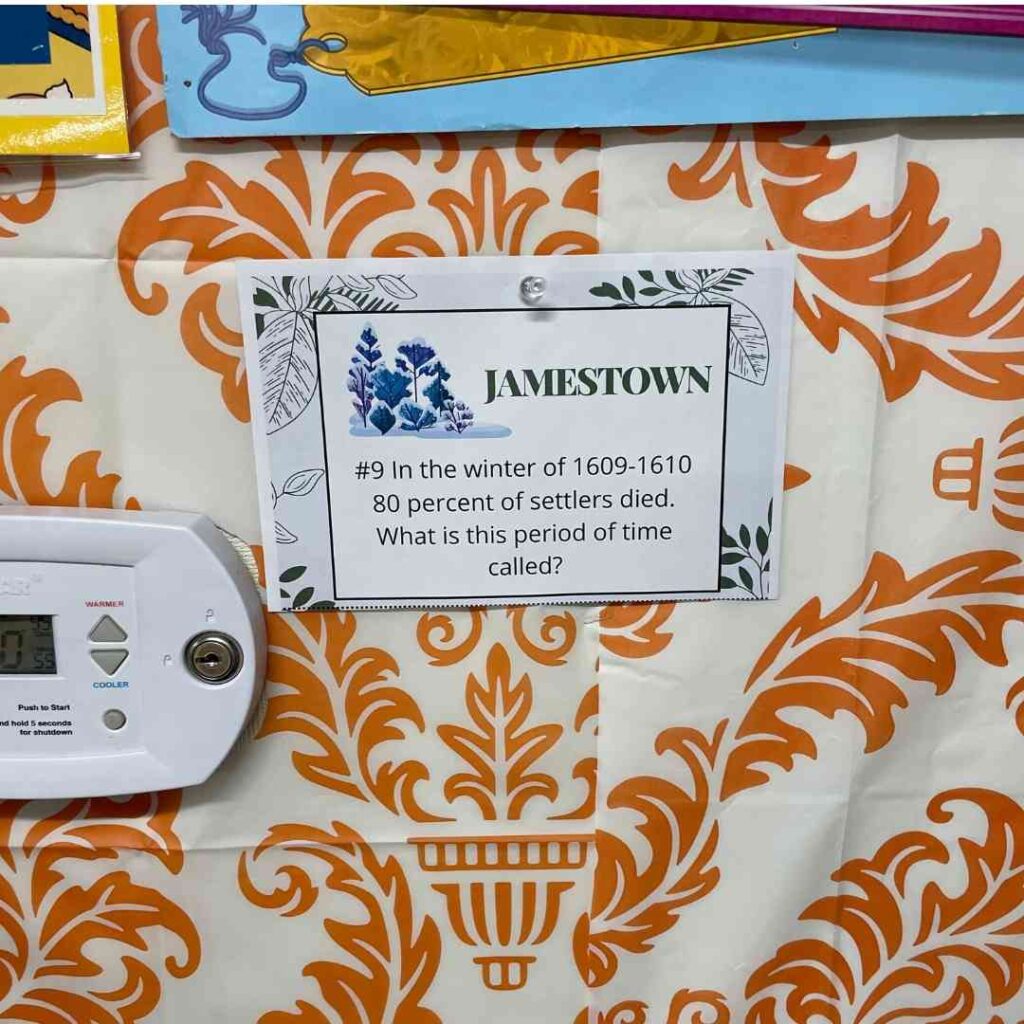Kids forget stuff. It happens. Our job as educators is to review key concepts and vocabulary after lessons. So how do we do that in a fun, and engaging way? Through play of course! Here are 5 easy, no-prep review games and activities that you can do today (or tomorrow)
Review Games that Require No Teacher Preparation
#1 Win, Lose, or Draw Game
Students get a real kick out of drawing and using the teacher’s View Board or whiteboard. Remind students that not everyone will get a chance to draw since that would make the game too long.
Here’s how to play:
- Divide students up into teams of about five. Each team will select someone to draw whatever word or phrase that you give them.
- Choose words that pertain to the subject you are teaching. If you need some help with thinking of words, find words online or use your textbook. This is a no-prep activity so I don’t write any words down beforehand. I usually will whisper it to the drawer or have them come to my desk and I will write the word down discreetly. (I clearly don’t have my act together).
- The drawer has 45 seconds to draw and for their team to guess what they are drawing. The team can yell out answers but the other teams have to remain silent.
- If they guess the word correctly within 45 seconds, the team gets a point. If they don’t, other teams can answer. I randomly choose a student to answer, and if they know it, their team gets a point. If they don’t, I continue choosing students until someone knows it. If three students in a row don’t know it, I let the drawer reveal the answer.
The team with the most points wins.

#2 Charades Game
Charades is a classic game that students enjoy. Have your students act out concepts from the previous lesson without speaking.
You’ll need to create a list of words or phrases related to the material you want to review. Decide on your rules beforehand and encourage students to use gestures, facial expressions, and body movements.
Remind students that sound effects are not allowed. Also, let students know they can hold up their fingers to signal how many words there are or they can point to their ear, which means “sounds like”.
Here’s how to play:
- Divide the class into two or more teams. Each team takes turns performing and guessing.
- Designate someone to keep track of time. I typically allow 2 minutes, depending on how hard the words are.
- Teams can shout out their guesses during the 2-minute time period, but all other teams have to remain silent.
- If the team correctly guesses the word or phrase, they earn a point. If not, the opposing team gets a chance to steal the point by guessing it correctly.
- Continue rotating turns between teams, with different players taking on the role of the actor.
#3 Hangman
Hangman is an oldie but a goodie to review content vocabulary. It seems so simple, but I promise you that my 5th graders love playing this classic game. If you feel uncomfortable or offended by playing Hangman, there are other options.
I won’t assume that everyone knows how to play Hangman. So just in case you don’t, here are the rules.
How to play:
- Divide students into teams.
- Draw underscores to represent the letters and a gallow
- Allow students to guess what letter is in the word
- If the letter is in the word, write it in the correct position(s) on the underscores.
- If the letter is not in the word, a part of a stick figure (representing a “hangman”) is drawn on the gallows, and the letter is written to the side.
- For every letter that is answered wrong, a new body part appears. I usually draw a stickman that has a face, body, arms, and legs. But of course, customize your own rules.
- If a student correctly guesses the word before the hangman is fully drawn, their team gets a point.
- The team with the most points wins.

#4 Spelling Bee
This may seem like an antiquated game, but I swear my students beg to play it. Basically, students take turns spelling words aloud. If a student spells the word correctly, they remain in the competition; if not, they are eliminated. The last student remaining after all others have been eliminated is declared the winner.
I usually give my students spelling words that follow a certain spelling pattern that we are working on. I’ll head over to Chat GPT and ask it for a list of multi-syllabic words that follow the pattern, just to make the game more challenging.
Throw in some Social Studies or Science words that are related to the theme you are currently studying. Be sure to have students line up standing. This gets students out of their seats, which makes it more engaging. Students who spell a word wrong must sit down.
#5 Pyramid Game
The Pyramid Game was a famous game show that required players to guess words or phrases based on clues given by their teammates. My students really enjoy this game because they work with a partner and get a chance to get out of their seats.
The actual game involves choosing categories, but to make this a no-prep activity, I suggest not doing that.
How to play:
- Have students get with a partner, and they must stand face to face. One student will have their back facing the View Board or whiteboard, while the other students can still see it.
- Write 5 words that are in the shape of a pyramid. Three on the bottom, two in the middle, and one on top.
- The student who can see the board has 30 seconds to give clues to their teammate. The teammate tries to guess the words that are written on the board.
- The guesser writes down how many points they answered correctly. Each word is worth a point.
- Reverse roles
- The player with the most points wins.

#6 Walk the Room
Another review activity that gets students out of their seats and moving is Write the Room. What is Write the Room exactly? It’s an activity that involves reviewing any subject.
How to Play:
- Post any number of questions around the room. I usually post questions for as many students as I have. So if I have 26 students, I try to post 26 questions.
- Students number their papers from #1-26
- They walk around and answer the questions on their piece of paper
It’s simple, and students love working together to solve the problems. It’s also an opportunity to talk about the subject and use vocabulary with each other. Below is an example of Walk the Room 13 Colonies questions I posted.

If you want more details about this activity with classroom management tips on how to implement it, please read my Walk the Room post HERE.
Final Thoughts
Reviewing doesn’t have to mean more worksheets or extra planning. These quick, no-prep games are a great way to reinforce vocabulary and key concepts while keeping your students engaged and moving. Whether you’ve got five minutes or a whole period, these activities can turn any lesson into a fun, memorable review session. Send me a message on Instagram, and let me know which one your class enjoyed the most —or if you have your own go-to review game to share!
